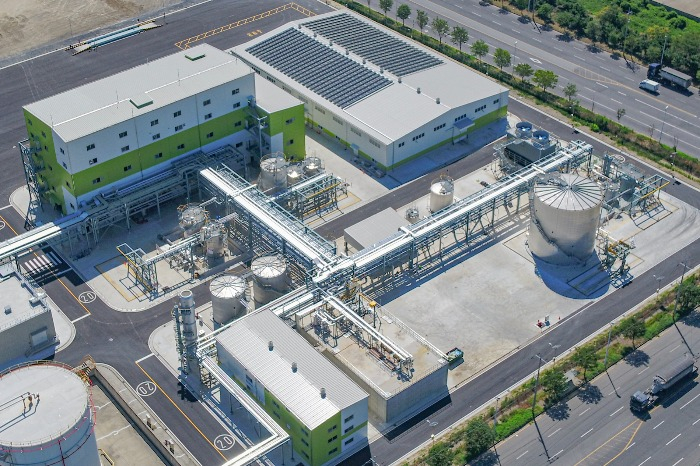Samyang transitions to white biotech with S.Korea’s first isosorbide plant
Samyang Innochem, a joint venture between Samyang and Japan's Mitsubishi, operates an isosorbide plant in Gunsan, North Jeolla province
By Nov 17, 2022 (Gmt+09:00)
LG Chem to sell water filter business to Glenwood PE for $692 million


Kyobo Life poised to buy Japan’s SBI Group-owned savings bank


KT&G eyes overseas M&A after rejecting activist fund's offer


StockX in merger talks with Naver’s online reseller Kream


Mirae Asset to be named Korea Post’s core real estate fund operator



Samyang Group, a diversified conglomerate, has long focused on the chemicals and foodstuffs sectors.
While adding to its existing chemicals businesses that involve engineering plastics with products such as industrial fibers and plastic bottles, the company has recently turned its attention to white biotechnology.
Samyang Innochem Corp., a joint venture between Samyang Holdings and Japan's Mitsubishi Corp., built and operates an isosorbide plant in Gunsan, North Jeolla Province.
Sprawling across a 23,000-square meter footprint, the plant boasts an annual production capacity of 10,000 tons of isosorbide.
Machines inside the four-story factory add catalysts to corn-derived sorbitols, a naturally occurring sugar alcohol found in edible plants.
Isosorbide is a bicyclic chemical compound, and one of the best-known white biotechnology materials.
It can be turned into bio polycarbonate (PC), bio PET and bio polyurethane (PU), among others. These materials have broad applications for making plastics, paint varnishes and adhesives, to name a few.
Samyang Innochem is Korea's only isosorbide manufacturer; the group has been operating in the white biotechnology sector for 13 years.
Starting in 2009, it invested 35 billion won ($26.1 million) spread over six years to secure the technology to commercialize isosorbide, and began building the Gunsan plant in 2015.
Construction was completed this past July and then underwent several months of pilot operation. The company launched commercial production back in February and held its ribbon-cutting this Tuesday.
At the ceremony, Samyang Group Chairman Kim Yoon said, “We will pursue gradual expansion in line with the growth of the white biotechnology market.” He added that the company plans to increase the annual production capacity to 40,000 tons by opening a second plant by 2025.
France’s Roquette, the world's leading isosorbide producer, has an annual production capacity of 20,000 tons.
Write to Seo-Woo Jang at suwu@hankyung.com
Jee Abbey Lee edited this article.
-
 Business & PoliticsTrump Jr. meets Korean business chiefs in back-to-back sessions
Business & PoliticsTrump Jr. meets Korean business chiefs in back-to-back sessionsApr 30, 2025 (Gmt+09:00)
-
 Korean chipmakersSamsung in talks to supply customized HBM4 to Nvidia, Broadcom, Google
Korean chipmakersSamsung in talks to supply customized HBM4 to Nvidia, Broadcom, GoogleApr 30, 2025 (Gmt+09:00)
-
 EnergyLS Cable breaks ground on $681 mn underwater cable plant in Chesapeake
EnergyLS Cable breaks ground on $681 mn underwater cable plant in ChesapeakeApr 29, 2025 (Gmt+09:00)
-
 Business & PoliticsUS tariffs add risk premium to dollar assets: Maurice Obstfeld
Business & PoliticsUS tariffs add risk premium to dollar assets: Maurice ObstfeldApr 29, 2025 (Gmt+09:00)
-



